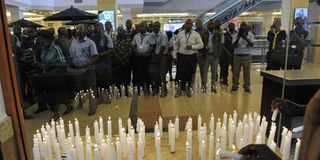Two years after Westgate mall: The things that have now changed forever

Nakumatt supermarket staff light candles marking the second anniversary of the Westgate shopping mall attack by Al-Shabaab militants on September 21, 2015, in Nairobi. Though the mall reopened in an emotional ceremony in July, the memory of that day is still raw for many. PHOTO | AFP
What you need to know:
- There are several things we learnt after the Westgate attack, including a very old lesson — that societies and nations are shaped, and sometimes improve themselves, through the battles they lose rather than the ones they win.
- Because malls like Westgate are targeted at cosmopolitan shoppers, by necessity they had to be impersonal. That has its appeal, but the Al-Shabaab attack revealed its limits.
Monday was the second anniversary of the attack on Nairobi’s Westgate mall by Al-Shabaab militants.
The mall reopened in an emotional ceremony in July, but with nearly 70 people having been killed and 175 wounded, the memory of that day is still raw for many, and the struggle to come to terms with what happened will continue for many years to come.
There are several things we learnt after the Westgate attack, including a very old lesson — that societies and nations are shaped, and sometimes improve themselves, through the battles they lose rather than the ones they win.
A BATTLE LOST
The Westgate attack was a battle lost. So was the post-election violence that followed the December 2007 election.
However, the latter made possible the 2010 Constitution and allowed Kenya to get in touch with and to learn to fear its dark side.
Without that, the election dispute of 2013 might have been resolved in the streets instead of the Supreme Court. Though many might not have liked the outcome, it was progress nevertheless.
The Westgate mall attack might not have had that kind of political impact, but it did change many things socially and economically.
The most obvious one is what is happening in Karura Forest northwest of Nairobi. Karura used to be a hang-out for a few hardline environmentalists.
VERY APPREHENSIVE
A year before the Westgate, I remember us going to walk across it so we could emerge on Kiambu Road.
We had no idea just how big it was. When we got half-way, it was so lonely and scary, we contemplated turning back, fearing that wild dogs might emerge from the trees and maul us, but mostly that a criminal gang was surely waiting to pounce.
Weeks back, there had been reports that a woman had been dragged into the forest and killed.
After Westgate, Nairobians, afraid of being trapped inside a wall by gun-totting madmen, discovered Karura Forest in a big way. Unlike in the past when Karura Forest was desolate, today it has the opposite problem — it can get crowded.
MALL IS BOOMING
Many of these green patrons have been produced by the Westgate tragedy and a whole new “little” economy — e.g. renting bikes for forest rides — has grown up in Karura.
In the ultimate sign of the change, the bumpy earth track leading into the forest is being replaced by a sleek tarmac road!
And now the environmentalist fundamentalists think the barbarians have taken over their shrine, and are looking for purer forests to hang out. No one would have bet on that outcome two years ago.
But the most intriguing change is in the idea of the mall itself. There were those who argued that after Westgate, the mall in Kenya was dead.
However, the opposite has happened — the mall is booming. The Thika Road Mall had opened seven months before the Westgate mall outrage. In the aftermath, it thrived.
MALL FOR THE PEOPLE
Not too far off the even grander City Garden Mall opened recently. And in the near future, the Two Rivers Mall, off Limuru Road after Runda, will open. It will be Kenya’s, and one of Africa’s, biggest malls.
To understand what is going on, perhaps we need to look closely at Thika Road Mall (TRM). It is different from Westgate or Village Market in that it was not built in an upmarket suburb.
It went, so to speak, to the people. In his cheeky moments, Saturday Nation columnist David Ndii would say the mall has become “tribal” (in the salt of the Earth sense, and not being aimed at the expatriate crowds).
Because malls like Westgate are targeted at cosmopolitan shoppers, by necessity they had to be impersonal. That has its appeal, but the Al-Shabaab attack revealed its limits.
URBAN PHENOMENA
A mall like TRM is, well, built in the village, and keeping with our traditional ways, everyone is expected to know everyone else.
The security man at Westgate was not expected to personally know, or even fraternise, with the shoppers. They would, by definition, be strangers.
It is probably fully expected that the one at TRM should draw the attention of his supervisor to a shopper who “doesn’t look like he is from around these parts” or “is walking in a suspicious way”.
So, thanks to Westgate, to succeed, Nairobi’s malls cannot be hyper urban phenomena. They have to bring a bit of the village along.
The author is editor of Mail & Guardian Africa. Twitter@cobbo3





